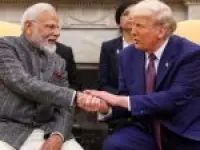
Adish Aggarwala, who is also the co-author of PM Modi's biographies, is not new to controversy.
During today”s hearing on electoral bonds, Adish Aggarwala, the president of the Supreme Court Bar Association (SCBA), found himself on the receiving end of a stern rebuke from Chief Justice of India (CJI) DY Chandrachud. Aggarwala, a senior advocate and leader within the legal community, had sought a suo motu review of the Supreme Court”s recent landmark judgment. This judgment, delivered last month, invalidated the electoral bonds scheme and mandated the State Bank of India (SBI) to disclose all details regarding political funding facilitated through these bonds.
When Aggarwala brought up the matter during the hearing, Chief Justice Chandrachud dismissed Aggarwala’s actions as mere publicity-seeking and cautioned against delving further into the issue.
“Apart from being a senior counsel, you are president of SCBA. You have written a letter invoking my suo motu powers. These are all publicity- stuff and we will not get into this. Do not make me say anything more. It will be distasteful.”
Solicitor General Tushar Mehta distanced himself from Aggarwala”s plea, stating, “We don”t support this.”
Aggarwala had stirred controversy by writing to President Droupadi Murmu, urging her to seek a presidential reference on the Supreme Court”s judgment regarding electoral bonds. His actions were disavowed by the SCBA, which clarified that Aggarwala had not been authorized by the panel to correspond with the President.
“It has become expedient for the Executive Committee of the Supreme Court Bar Association to make it abundantly clear that the members of the committee have neither authorised the President (Aggarwala) to write any such letter nor do they subscribe to his views as expressed therein.
“The Executive Committee of the Supreme Court Bar Association further views this act as well as the contents therein as an attempt to overreach and undermine the authority of the Hon”ble Supreme Court of India and unequivocally condemn the same,” a resolution issued by the bar association”s Secretary Rohit Pandey said.
The resolution noted that Aggarwala”s letter appeared to be written in his capacity as Chairman of the All India Bar Association. However, it pointed out that below his signature, he had mentioned his designation as President of the Supreme Court Bar Association.
In his letter to the President, Aggarwala urged her to seek a presidential reference regarding the top court”s ruling and advised against implementing it until further hearings. He expressed concerns that disclosing the names of corporate donors to political parties could expose them to potential victimisation. He argued that enforcing the judgment retroactively and divulging all information could damage the nation”s reputation on the global stage.
Aggarwala, who is also the co-author of PM Modi”s biographies, is not new to controversy.
Last month, at least 161 members of the SCBA called for his removal following his controversial letter to Chief Justice of India DY Chandrachud regarding the farmers’ protest.
In his letter to the CJI, Aggarwala expressed concern over the farmers’ protest and urged proactive judicial intervention to prevent disruption to public life.
“Even if the farmers have genuine demands, they don’t have the right to put the general public to hardship. This is the right time when the Hon’ble Supreme Court should act suo motu and ensure that these farmers don’t create any nuisance and cause huge inconvenience to the general public,” his letter said.
The protest, he said, coming a few months before the general elections, was “politically motivated”. He also requested instructions to prevent adverse court orders due to advocates’ non-appearance amidst the ongoing agitation.
Last year, when the All India Bar Association (AIBA) approached Union Home Minister Amit Shah seeking a 360-degree probe into the “international conspiracy angle” in BBC”s documentary on Prime Minister Narendra Modi, AIBA chairman Aggawala had once again questioned the timing of the documentary, its contents and called its promotion as “dangerous”.













